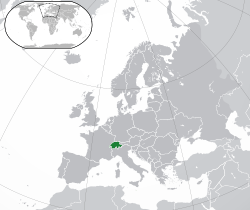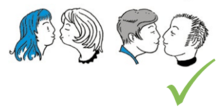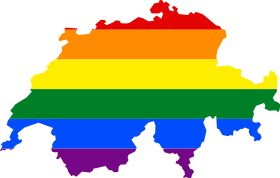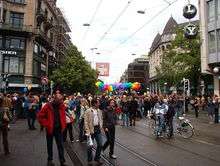LGBT rights in Switzerland
| LGBT rights in Switzerland | |
|---|---|
 Location of Switzerland (green) in Europe (dark grey) – [Legend] | |
| Same-sex sexual intercourse legal status |
Legal in Geneva, Ticino, Vaud, and Valais since 1798; legal nationwide since 1942 Age of consent equalised in 1992 through referendum |
| Gender identity/expression | Transgender people allowed to change legal gender |
| Military service | Gays, lesbians and bisexuals allowed to serve openly |
| Discrimination protections | Sexual orientation protections in certain areas (see below) |
| Family rights | |
| Recognition of relationships | Registered partnerships since 2007 |
| Adoption | Stepchild adoption legal; Full adoption banned |
Lesbian, gay, bisexual, transgender (LGBT) rights in Switzerland are relatively progressive by European standards, although LGBT people lack full legal equality. Its history is one of liberalisation at an increasing pace since the 1940s, in parallel to the legal situation in Europe and the Western world more generally. Despite this, same-sex marriage, full joint adoption and IVF access are still banned in Switzerland as of 2018.
Same-sex sexual acts between adults have been legal in Switzerland since 1942. The age of consent has been equal at 16 for heterosexual and homosexual sex since 1992. There has been legal recognition for same-sex relationships since 2007. A legal procedure for the registration of sex changes following sex reassignment surgery was outlined in 1993. Additionally, since 2010, authorities have followed a practice of registration of sex changes without any requirement of surgery. The Swiss Constitution of 1999 (Art. 8) guarantees equal treatment before the law, specifying "way of life" as one of the criteria protected against discrimination.
The largest homosexual rights advocacy groups in Switzerland are Lesbenorganisation Schweiz for lesbian rights (founded in 1989) and Pink Cross for LGBT rights (founded in 1993). Transgender Network Switzerland (TGNS) was founded in 2010. In the 2010s, these groups have increasingly tended to make use of the acronym LGBTI (for "lesbian, gay, bisexual, transgender, intersex") as an umbrella term for their respective areas of interest.[1] Intersex organization Zwischengeschlecht campaigns for intersex rights and bodily autonomy.[2]
Legality of same-sex sexual activity
Same-sex sexual activity was decriminalised nationwide in 1942 though in the cantons of Geneva, Ticino, Vaud and Valais, same-sex sexual activities were decriminalized in 1798 in accordance with the Napoleonic Code.[3]
The higher age of consent for same-sex sexual activity (20 years instead of 16 for heterosexual sexual activity) was repealed by the criminal law reform of 1992.[4] In a national referendum on 17 May 1992, 73% of the voters accepted the reform of Swiss federal legislation on sexual offences, including the elimination of all discrimination against homosexuality from the Penal Code. Article 187 of the Criminal Code states that the general age of consent for sexual activity in Switzerland is 16.
Recognition of same-sex relationships

Registered partnerships have been recognized since 1 January 2007, when the Registered Partnership Act came into force. Prior to this, the cantons of Geneva, Fribourg, Neuchâtel and Zürich already allowed registered partnerships.[5] In 2007, one in ten of all marriages in the Zurich were registered partnerships between members of the same sex, and it has registered about 2,750 couples as of 2016.[6]
Same-sex marriage is not legal. In 2013, the Green Liberal Party of Switzerland introduced an initiative to legalize same-sex marriage to the Swiss Parliament.[7] The initiative was approved 12–9 by a National Council committee in February 2015 and 7–5 by a Council of States committee in September 2015. An act is currently being drafted and is expected to be finalised by February 2019, and will then be presented to Parliament for final deliberation. In November 2016, voters in the canton of Zürich rejected a proposal to constitutionally ban same-sex marriage, with 81% against.[8] Additionally, polls have shown that a majority of the Swiss population supports same-sex marriage, with the most recent one finding 75% support.[9] A law passed by Parliament can be challenged by opponents in a referendum, if they collect 50,000 valid signatures within 100 days.[10]
Adoption and parenting
Single people, regardless of sexual orientation, may adopt children. A bill legalizing stepchild adoption for same-sex couples was approved by Parliament in spring 2016. Opponents unsuccessfully tried to force a referendum on the bill. The law came into effect on 1 January 2018.[11][12]
Joint adoption is currently illegal for same-sex couples in Switzerland, as it is restricted to married couples. The 2013 initiative legalising same-sex marriage will thus also allow married same-sex couples to adopt jointly.[13]
Discrimination protections
Anti-discrimination laws

The Swiss Constitution (Art. 8) guarantees equal treatment before the law, specifying "way of life" (meaning, sexual orientation or gender identity) as one of the many stated criteria protected against unfair discrimination. Swiss law recognizes a very strong principle of freedom of association and, as such, has only limited provisions to outlaw discrimination in the private sector or between private individuals. Notable exceptions are the law for equal treatment of men and women (German: Bundesgesetz über die Gleichstellung von Frau und Mann; French: Loi fédérale sur l'égalité entre femmes et hommes; Italian: Legge federale sulla parità dei sessi; Romansh: Lescha federala davart l'equalitad da dunna ed um) and the law against racial discrimination (Art. 261bis of the Criminal Code) outlawing discrimination based on "race, ethnicity or religion". Because of this situation, private lawsuits against alleged discrimination in recent years have increasingly attempted to invoke the difficult-to-interpret prohibition of "personal injury" (Art. 28a of the Civil Code).[14] Discriminatory termination of employment is protected against if it can be shown that employment was terminated based on "a property to which the other party is entitled by virtue of their personhood, except where that property bears a relation to the nature of the employment contract or significantly affects the work environment"[15] However, there have been very few actual legal proceedings based on lawsuits against alleged discrimination on such grounds. A 2015 survey found seven individual cases, none of which involved alleged discrimination based on sexual orientation or gender identity.[16]
On 7 March 2013, Mathias Reynard, member of the Social Democratic Party, introduced to the Swiss Parliament a bill to outlaw all "discrimination and incitement of hatred" (German: Diskriminierung und Aufruf zu Hass; French: discrimination et incitation à la haine; Italian: discriminazione e incitazione all'odio) on the basis of "race, ethnicity, religion or sexual orientation".[17] On 11 March 2015, the National Council voted 103-73 to allow the bill to continue through the legislative process.[18][19] The Committee of Legal Affairs of the Council of States allowed the bill to proceed on 23 April 2015. In February 2017, the Committee of Legal Affairs of the National Council approved, in a 15–9 vote, an amendment to the bill adding "gender identity" as a prohibited ground of discrimination.[20] In March 2017, the National Council decided to fix 2019 as the deadline, by which the bill must be finalised and ready to be voted upon.[17] The bill is officially opposed by the Swiss People's Party (SVP/UDC),[21] which regards it as unnecessary. The remaining parties mostly support the bill, as do 86% of the Swiss people (including 78% of SVP voters).[22][23]
In August 2018, the Federal Council announced its support for the proposal, but recommended that the term gender identity be removed due to its alleged "vagueness".[24] The National Council refused to remove the term, and approved the bill on 25 September 2018, in a 118-60 vote, with 5 abstentions.[25][26] Now, it will be sent to the Council of States for a final vote, which is expected to take place sometime in December 2018.
In May 2016, the Swiss Federal Council based on a 2015 report commissioned from the "Swiss Centre of Expertise in Human Rights" mentioned the option to extend the law against racial discrimination to include "discrimination based on sexual orientation", plans for a law providing simpler processes for gender recognition and greater protections from discrimination on the basis of gender identity and sex characteristics.[27]
In September 2017, the cantonal executive body of Geneva adopted new regulations against discrimination based on sex, sexual orientation and gender identity within the Cantonal Government.[28]
Hate crime laws and violence
In November 2016, Swiss LGBT groups began offering a helpline to LGBT people.
In August 2017, in response to a motion proposed by the Conservative Democratic Party, the Swiss Government announced that it would not count and register hate crimes committed against members of the LGBT community. The Government said it would be too difficult to keep track of these crimes, as it isn't always clear if the victim's sexual orientation or gender identity was a factor.[29]
A 2018 survey of 1,700 Neuchâtel school children (14-15 years old) found that 10% of girls and 5% of boys identified as LGBT. Among these, 38% reported receiving slaps, kicks or punches, 25% reported frequent harassment, 16% reported being victim of physical violence and 7% reported being discriminated against by a teacher.[30]
Military service
.jpg)
Since 1992, homosexuality and bisexuality are no longer mentioned in the Military Criminal Code (MCC).[31] After a referendum on 17 May 1992, the then Article 127 dealing with unnatural fornication in the military ("Who makes a lewd affair with a person of the same sex will be punished with prison ...") was abolished.[32]
Gender identity and expression
Swiss legal practice allows transgender persons to change their officially registered gender through judicial proceedings. The Swiss Government wrote in May 2018 that "the absence of any clear ruling in law means that transgender individuals continue to face enormous hurdles. They must sue in court to have their change of gender legally recognised. Legal practice is inconsistent, and proceedings are found to be unnecessarily protracted and expensive."[33]
This situation developed as follows: A 1993 ruling by the Federal Supreme Court (BGE 119 II 264) allows for a legal procedure for the registration of sex changes. In February 2010, in an extension of the scope of the 1993 Federal Supreme Court ruling, the Federal Office for Civil Registration (EAZW/OFEC/UFSC) of the Federal Department of Justice and Police advised cantonal executives to legally recognize sex changes even in the absence of surgery. The EAZW made it explicit, with reference to the principle of separation of powers, that the order is binding only for cantonal executive organs and not for cantonal courts of law.[34] The Federal Office for Civil Registration also stated that a marriage can be converted into a registered partnership if one of the partners should register for gender recognition.[35]
In May 2018, the Federal Council proposed amending Swiss legislation to allow transgender individuals to change their registered gender and first name(s) without "red tape", simply by making a declaration to civil status registry officials.[33][36] The proposed changes will undergo a public consultation period before being submitted to the Federal Assembly.
In 2018, the National Council, the lower house of Parliament, expressed support for an "X" sex descriptor on identity documents, with 107 votes in favour. A separate motion to allow intersex individuals to leave their sex entry blank was also accepted, with 109 votes in favour.[37] The Federal Council will now review the motions and later express recommendations.
Blood donation
In 1980s, a ban on gay and bisexual men donating blood was enacted. The ban was due to the HIV/AIDS pandemic.[38]
In June 2016, the Swiss Red Cross announced it would address a request to Swissmedic, Switzerland's surveillance authority for medicines and medical devices who has the last word on the matter, and ask for the ban to be lifted. Under the new rules, gay and bisexual men could begin donating blood and stem cells after a one-year deferral period on 1 July 2017.[38][39][40][41]
In early May 2017, the National Council approved a motion calling on all restrictions on gay and bisexual men donating blood to be lifted. According to the National Council, only risky behaviour should be a factor for blood donation, not one's sexual orientation. The motion, introduced by the Conservative Democrats, was approved 97-89.[42] However, this was rejected by the Council of States on 29 November 2017.[43] The 1 year deferral period for gay/bisexual men donating blood therefore remains in place.
Conversion therapy
In 2016, Conservative Democrat MP Rosmarie Quadranti requested the Swiss Federal Government to undertake measures to outlaw conversion therapy on LGBT minors.[44][45] The Swiss Federal Council wrote in response that in its view, conversion therapies are "ineffective and cause significant suffering to young people subjected to them", and would constitute a breach of professional duties on the part of any care professional undertaking them. As such, in the Government's view, any care professional undertaking such therapies is already liable to be sanctioned by the cantonal authorities. Whether such therapies also constitute a criminal offense is to be determined by the criminal courts in individual cases, according to the Federal Council.[46]
Reports emerged in summer 2018 of a therapist claiming to be able to "cure" homosexuality through homoeopathy. He was promptly fired, and an investigation was opened with the Geneva Ministry of Health.[47] According to the Ministry, believing that homosexuality is an illness is sufficient enough to open an investigation. The Association des Médecins du Canton de Genève describes conversion therapy as a form of charlatanism.
Position of political parties
Among the major political parties, the Social Democratic Party (SPS/PSS), the Green Party (GPS/PES), the Green Liberal Party (GLP/PVL) and the Conservative Democratic Party (BDP/PBD) are generally in favour of LGBT rights, whereas the Christian Democratic People's Party (CVP/PDC) and the Swiss People's Party (SVP/UDC) are generally opposed.[48] The FDP.The Liberals (FDP/PLR) are mostly in support of same-sex marriage, though their position on LGBT adoption is unclear.[49][50]
Public opinion
A 2016 poll commissioned by gay-rights organisation Pink Cross found that 69% of Swiss population voiced support same-sex marriage, with 25% opposed and 6% undecided. Divided by political orientation, the poll found support at 94% among Green Party voters, 63% among Christian Democrat voters and 59% among Swiss People's Party voters.[22][51] According to the same poll, 50% of the Swiss people supported full joint adoption for same-sex couples, while 39% were opposed and 11% were undecided.
A December 2017 Tamedia poll found that 72% of Swiss supported same-sex marriage, with 25% opposed. 88% of Greens, Social Democrats and Green Liberals, 76% of Liberal voters, 66% of Christian Democrats, and 56% of Swiss People's Party voters expressed support.[52]
A 2017 Pew Research Center poll found support for same-sex marriage among Switzerland's population at 75%, with 24% opposed and 1% undecided.[9]
LGBT rights movement in Switzeland

Since the mid-1990s, an annual Coming Out Day has been held with various publicity events in order to encourage LGBT people to develop a positive relationship with their identity, particularly among young LGBT people.
Claude Janiak, State Councillor (Senator) and former National Council President, is involved in AIDS work, Network, and the Pink Cross.
Corine Mauch, the Mayor of Zürich, Switzerland's biggest city, is openly gay.
The "Gay Happiness Index" (GHI) published based on a poll by PlanetRomeo lists Switzerland at rank nine with a GHI score of 70.[53]
In 2017, the rights group Rainbow Europe ranked Switzerland three places lower after the Government did not heed requests, including updates to its anti-discrimination laws to explicitly include gender identity and sexual orientation.[54]
In 2018, a Chur bishop drew controversy after claiming that child sex abuse and paedophilia in the Roman Catholic Church were justified because "90% of the victims were of a homosexual tendency".[55]
Summary table
| Same-sex sexual activity legal | |
| Equal age of consent (16) | |
| Anti-discrimination laws in employment only | |
| Anti-discrimination laws in the provision of goods and services | |
| Anti-discrimination laws in all other areas (incl. indirect discrimination, hate speech) | |
| Anti-discrimination laws concerning gender identity | |
| Same-sex marriages | |
| Nationwide recognition of same-sex couples | |
| Stepchild adoption by same-sex couples | |
| Joint adoption by same-sex couples | |
| Gays, lesbians and bisexuals allowed to serve openly in the military | |
| Right to change legal gender | |
| Third gender option | |
| Access to IVF for lesbians | |
| Conversion therapy banned | |
| Commercial surrogacy for gay male couples | |
| MSMs allowed to donate blood |
See also
References
- ↑ Pink Cross: Schweizer Dachverband der Schwulen
- ↑ Zwischengeschlecht.org (March 2014). "Intersex Genital Mutilations Human Rights Violations Of Children With Variations Of Sex Anatomy: NGO Report to the 2nd, 3rd and 4th Periodic Report of Switzerland on the Convention on the Rights of the Child" (PDF). Zurich.
- ↑ The History of Homosexuality: The Napoleonic Code
- ↑ State-sponsored Homophobia A world survey of laws prohibiting same sex activity between consenting adults Archived 11 June 2012 at the Wayback Machine.
- ↑ Gay couples win partnership rights
- ↑ (in German) Kein Run aufs Standesamt, Swissinfo, accessed 1 November 2009
- ↑ (in German) Nationalratskommission will «Ehe für alle», Neue Zürcher Zeitung, 6 July 2018
- ↑ (in German) Keine Definition der Ehe zwischen Mann und Frau in der Verfassung
- 1 2 Being Christian in Western Europe, Pew Research Center, 29 May 2018
- ↑ Mandatory referendums and optional referendums in Switzerland
- ↑ "Le nouveau droit de l'adoption entrera en vigueur le 1er janvier 2018". www.admin.ch (in French). Retrieved 2017-07-12.
- ↑ "Stepchild adoption will be possible from 2018". Swissinfo. 10 July 2017. Archived from the original on 5 September 2017. Retrieved 5 September 2017.
- 1 2 «Ehe für alle» bringt volles Adoptionsrecht, Luzerner Zeitung, 3 June 2018
- ↑ Privatrechtliche Normen zum Schutz vor Diskriminierung (humanrights.ch), September 2016.
- ↑ Eigenschaft, die der anderen Partei kraft ihrer Persönlichkeit zusteht, es sei denn, diese Eigenschaft stehe in einem Zusammenhang mit dem Arbeitsverhältnis oder beeinträchtige wesentlich die Zusammenarbeit im Betrieb SR 210.328
- ↑ Walter Kälin et al., Der Zugang zur Justiz in Diskriminierungsfällen (2015), 43f. Alleged grounds for discrimination included: religion (1990), race (1993), antisemitism (1999), political orientation (animal rights activism, 2002), race (2005), age (2005) and ethnicity (2006).
- 1 2 "Lutter contre les discriminations basées sur l'orientation sexuelle" (in French). Le Parliament suisse. Retrieved 1 May 2016.
- ↑ Morgan, Joe (12 March 2015). "Switzerland votes for law to protect LGBTIs from prejudice". Gay Star News.
- ↑ (in French) Bulletin Officiel
- ↑ HOMOPHOBIE ET TRANSPHOBIE: L’ADAPTATION DU CODE PÉNAL SUISSE VA DE L’AVANT
- ↑ (in French) LOI CONTRE L’HOMOPHOBIE ET LA TRANSPHOBIE: LA DROITE FREINE DES QUATRE FERS 360.ch, 10 October 2017
- 1 2 (in French) LARGE CONSENSUS POUR LES DROITS DES LGBT
- ↑ (in French) LOI CONTRE L’HOMOPHOBIE ET LA TRANSPHOBIE SUR LA BONNE VOIE
- ↑ (in French) CODE PÉNAL: PAS DE PROTECTION POUR LES TRANS?
- ↑ (in French) L’ACTU LGBT D’AILLEURS…
- ↑ Schweiz: Parlament will LGBTI besser vor Hassrede schützen
- ↑ Renforcer la protection contre la discrimination, Communiqués, Le Conseil fédéral, 25.05.2016 See also: Touzain, François (26 May 2016). "La protection des LGBTI en Suisse est lacunaire". 360°.
- ↑ (in French) GENÈVE S’ENGAGE CONTRE LES DISCRIMINATIONS
- ↑ (in French) LA CONFÉDÉRATION RENONCE À COMPTER LES CRIMES DE HAINE CONTRE LES LGBT 360.ch, 15 August 2017
- ↑ (in French) MALAISE CROISSANT PARMI LES ADOS
- ↑ LGBT world legal wrap up survey
- ↑ Schweizerisches Strafgesetzbuch. Militärstrafgesetz (Strafbare Handlungen gegen die sexuelle Integrität)
- 1 2 "Transgender individuals should be able to change their official gender and first name without red tape". www.admin.ch. Swiss Federal Council. 24 May 2018. Retrieved 24 May 2018.
- ↑ (in French) Victoire pour les trans suisses, 360.ch, retrieved on 11 May 2013
- ↑ (in French) Avis de droit OFEC: Transsexualisme Archived 17 May 2014 at the Wayback Machine., Federal Department of Justice and Police, retrieved on 11 May 2013
- ↑ Rapport explicatif relatif à l'avant-projet concernant la révision du Code civil suisse (changement de sexe à l'état civil)
- ↑ (in French) LE DÉBAT SUR LE 3E SEXE EST LANCÉ
- 1 2 "Ban on gay men giving blood in Switzerland set to be lifted". The Local.ch. 21 June 2016.
- ↑ Touzain, François (21 June 2016). "Timide ouverture pour le don du sang" (in French). 360°.
- ↑ (in German) Homosexuelle Männer sollen Blut spenden dürfen
- ↑ Switzerland Lifts Ban On Gay Men Donating Blood NewNowNext
- ↑ (in French) homosexuels au don du sang RTS INFO
- ↑ Restrictions for male gay blood donors to remain
- ↑ "Gay teen forced into therapy 'cure' by Christian community". The Local. 14 March 2016.
- ↑ (in French) «L’Etat doit tout faire pour interdire ces pratiques»
- ↑ "Interpellation 16.3073: Verbot und Unterstrafestellung von Therapien zur "Heilung" von Homosexualität bei Minderjährigen". www.parlament.ch. Retrieved 12 November 2017.
- ↑ (in French) Un médecin propose de « soigner » l’homosexualité par l’homéopathie
- ↑ "#WahlCH15: Parteien im LGBT-Check". queer.ch. 20 September 2015. Archived from the original on 6 March 2016.
- ↑ "Swiss Political Parties Reveal Their Colours". Swissinfo. September 11, 2015.
- ↑ (in German) FDP-Frauen für "Ehe für alle", Luzerner Zeitung, 21 April 2018
- ↑ (in French) Les Suisses pour l'introduction du mariage pour tous, selon un sondage
- ↑ Baumann, Bastian (21 December 2017). "Tamedia-Umfrage: 72% für Ehe für alle" (in German). Mannschaft Magazine.
- ↑ The Gay Happiness Index. The very first worldwide country ranking, based on the input of 115,000 gay men Planet Romeo
- ↑ "Switzerland drops down European gay rights ranking". The Local . 18 May 2017. Retrieved 17 October 2017.
- ↑ (in French) UN ÉVÊQUE SUISSE RELIE HOMOSEXUALITÉ ET ABUS SEXUELS DANS L’ÉGLISE
- ↑ "Mariage civil pour tous: hâte-toi (très) lentement" (in French). Les Blogs TDG. May 12, 2017.
- ↑ Flourishing surrogacy business raises fears
External links
